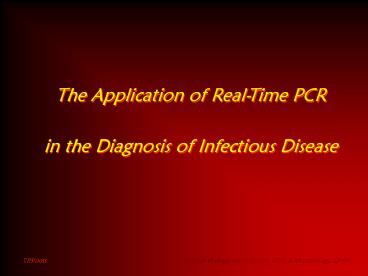The Application of Real-Time PCR - PowerPoint PPT Presentation
Title:
The Application of Real-Time PCR
Description:
The Application of Real-Time PCR in the Diagnosis of Infectious Disease T.P.Sloots Clinical Virology Research Unit, RCH, & Microbiology, QHPS. – PowerPoint PPT presentation
Number of Views:751
Avg rating:3.0/5.0
Title: The Application of Real-Time PCR
1
The Application of Real-Time PCR in the Diagnosis
of Infectious Disease
T.P.Sloots Clinical Virology Research
Unit, RCH, Microbiology, QHPS.
2
PCR
PCR
PCR
Why should we use PCR?
- Very sensitive (1 copy 10 copies of DNA)
- Can detect organisms that cannot be isolated
- Rapid (TAT lt 24 hrs)
3
real-time
real-time
real-time PCR
real-time
hardware
4
real-time
real-time
real-time
real-time
PCR
amplifies detects
integrated system
constant monitoring
fluorescent probes
rapid cycling times
fast turn-around
low contamination risk
sealed system
assay design
quantitative
5
real-time
real-time
TaqMan
real-time
hardware
ABI Biosystems
ABI 7700
- Microtitre plate format, sealed system
- Processes 96 samples in 2½ hours
- Real-time - amplification and detection
- Quantitative results
- Uses a fluorogenic probe, with reporter
quencher dyes - Taq DNA polymerase has 5-3 exonuclease activity
6
real-time
real-time
real-time
real-time
TaqMan
Emission
Excitation
FRET
Amplicon
ANNEALING
EXTENSION
Amplicon
5-3 exonuclease
7
real-time
real-time
LightCycler
real-time
Hardware
- Real-time detection
- Quantitative results
- Hybridization probes
- Can detect 2 targets simultaneously
- Uses capillaries (10-20ul)
- 32 samples / 60 minutes
- Sealed system contamination free
8
real-time
real-time
LightCycler
real-time
Set Up
9
real-time
real-time
LightCycler
real-time
Hardware
10
real-time
real-time
LightCycler
real-time
FRET
FRET (Fluorescence Resonance Energy Transfer)
using adjacent hybridization probes
Red 640
Phosphate
Emission
Amplicon
11
real-time
real-time
LightCycler
real-time
Operation
12
95oC
Denaturation
13
Emission
Tm
55oC
Primer/Probe Annealing
14
(No Transcript)
15
72oC
Primer Extension
16
real-time
real-time
LightCycler
real-time
Applications
- Detection of Infectious Disease agents
- Target Characterisation
- Determining Microbial Load (quantitation)
17
real-time
real-time
LightCycler
real-time
HSV PCR
266 swabs from multiple sites were collected in
VTM for HSV culture.
- 62 (23) were culture positive, confirmed by
antigen detection with MoAb (27 HSV-1, 35
HSV-2). - 113 (42) were LC-PCR positive following
extraction of VTM using a glass fibre column
(Qiagen). - 51 were LC-PCR positive and culture negative. All
these were confirmed as HSV by sequencing. - 1 culture / PCR - specimen. Was negative by
repeat culture, and remained negative by in
house PCR using different primers
18
real-time
real-time
LightCycler
real-time
Characterisation of HSV by melting curve
Application
HSV
DNA pol
Primers common to HSV 1 2
19
HSV 1
HSV 2
20
real-time
real-time
real-time
real-time
PCR quantitation
Microbial load testing
- For commensal organisms determine a normal
microbial load. Elevated level determines
infection. - Detect active infection by increasing load
- Detect anti-viral drug resistance (CMV, HSV)
21
real-time
real-time
real-time
real-time
PCR quantitation
Microbial Load Testing
22
Threshold Cycle
Concentration log 10
23
real-time
real-time
real-time
real-time
PCR quantitation
PRACTICAL APPLICATION
Monitoring CMV disease in transplant patients,
particularly Bone Marrow Transplant recipients.
- Early detection of disease progression to apply
appropriate drug therapy - Detect ganciclovir drug resistance
24
real-time
real-time
real-time PCR
real-time
Viral Load
BMT PATIENT 1
40 30 20 10 0
Ganciclovir
q-PCR
Antigenemia Positive cells per 200,000 cells
genome copies
Antigenemia
1 2 3 4 5 6
7 8 9 10 11
Sampling Time (Wks)
25
real-time
real-time PCR
real-time
Viral Load
BMT PATIENT 2
1 2 3 4 5 6 7
8 9 10 11 12 13
ROCHE PCR
in house PCR
80 60 40 20 0
Ganciclovir
Foscarnet
Antigenemia Positive cells per 200,000 cells
genome copies
q-PCR
1 2 3 4 5 6 7
8 9 10 11 12 13
Sampling Time (Wks)
26
real-time
real-time PCR
real-time
Summary
DISADVANTAGES OF REAL-TIME PCR
- Current technology has limited capacity for
multiplexing. Simultaneous detection of 2 targets
is the limit. - Development of protocols needs high level of
technical skill and/or support. (Requires RD
capacity and capital) - High capital equipment costs ( 50,000 -160,000).
27
real-time
real-time PCR
real-time
Summary
ADVANTAGES OF REAL-TIME PCR
- Rapid cycling times (1 hour)
- High sample throughput (200 samples/day)
- Low contamination risk (sealed reactions)
- Very sensitive (3pg or 1 genome eq of DNA)
- Broad dynamic range (10 - 1010 copies)
- Reproducible (CV lt 2.0 )
- Allows for quantitation of results
- Software driven operation
- No more expensive than in house PCR (15/test)
28
PCR Detection
- TaqMan and LC utilse probes
- Non-specific reactions with probe may occur
- Number of chromophors is limited
- Alternative detection technologies
- - molecular beacons
- - multiple arrays (gene chip)
29
Alternative Detection Technology
30
Molecular Beacons
- Hairpin shaped hybridisation probes
- Contain fluorophor and quencher
- Added to PCR reaction mix
- Hybridise to target during PCR
- Monitor end-point PCR
- Real-time PCR monitoring
- Allows more flexible thermocycling
parameters
31
real-time
real-time
real-time
real-time
molecular beacons
32
Molecular Beacons
APPLICATIONS
- Detection of amplification products (real time,
end-point) - Multicolour beacons detect multiple targets (8)
- Better detection of single point mutation
- Drug resistance analysis
- Non-PCR hybridisation analysis (in situ
labeling)
33
Multiple DNA Arrays
- Detection of thousands of gene sequences
simultaneously - Capacity for minitiarisation
- Suitable for automation
- Enormous analytical power
34
Multiple DNA Arrays
- Use of Multiple Arrays involves 5 steps
- Preparation of array containing capture probes
- Isolation, purification and labeling of test
sample DNA - Hybridisation of test sample DNA to capture
array - Detection of captured DNA hybrids
- Data analysis
35
(No Transcript)
36
gene arrays
gene arrays
gene arrays
gene arrays
microarrays (lt200um)
1000s genes/pcr amplified segments
pre (red)/post (green)
good controls
share data
37
Microarrays (Gene Chips)
- APPLICATIONS
- Genome mutational analysis
- Multiple drug resistance
- Monitor gene expression in cells
- Pharmocogenomics
- Screening for multiple infectious agents































